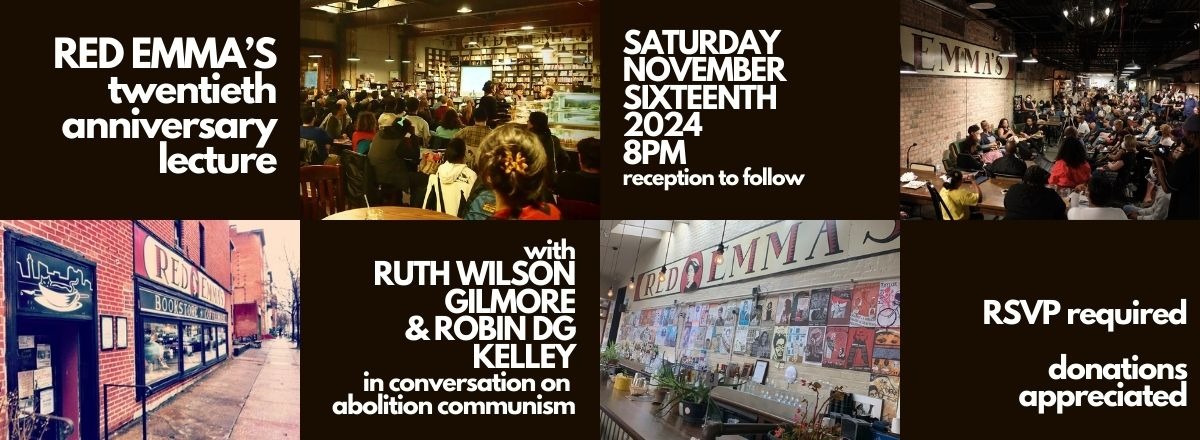
Red Emma's Education Fund
Red Emma's 20th anniversary lecture featuring Ruth Wilson Gilmore and Robin D.G. Kelley in conversation on abolition communism
UPDATE: WE ARE AT CAPACITY FOR THIS EVENT, AND RSVPS ARE NO LONGER OPEN. YOU CAN SIGN UP FOR THE WAITLIST IN CASE SPACES OPEN UP!
Join us as we celebrate 20 years of radical bookselling and workplace democracy! We are honored and thrilled to be joined at 8PM by Robin D.G. Kelley and Ruth Wilson Gilmore, in conversation on abolition communism:
Abolition is presence. We combine already-existing activities, suppressed knowledges, and fresh practices to strengthen communities-in-struggle, inventing new futures as we go. The real movement for abolition—of racial capitalism, carcerality, criminalization, borders—reorganizes what is into what we need to make a world in which life is precious.
Because we anticipate a very enthusiastic turnout, please note that RSVPs will be required for this talk. Donations to the Red Emma's Education Fund, which is powering our program of author events and our radical education work, are also appreciated.
Reception to follow the talk.
Ruth Wilson Gilmore is Professor of Earth & Environmental Sciences and Director of the Center for Place, Culture, and Politics at the City University of New York Graduate Center. Co-founder of many grassroots organizations including the California Prison Moratorium Project, Critical Resistance, and the Central California Environmental Justice Network, Gilmore is author of the prize-winning Golden Gulag: Prisons, Surplus, Crisis, and Opposition in Globalizing California (UC Press) and Abolition Geography: Essays Toward Liberation (Verso). Recent publications include “Beyond Bratton” (Policing the Planet, Camp and Heatherton, eds., Verso); “Abolition Geography and the Problem of Innocence” (Futures of Black Radicalism, Lubin and Johnson, eds., Verso); a foreword to Bobby M. Wilson’s Birmingham classic America’s Johannesburg (U Georgia Press); a foreword to Cedric J. Robinson on Racial Capitalism, Black Internationalism, and Cultures of Resistance (HLT Quan, ed., Pluto); and, co-edited with Paul Gilroy, Stuart Hall: Selected Writings on Race and Difference (Duke). Forthcoming projects include Change Everything: Racial Capitalism and the Case for Abolition (Haymarket). Gilmore has lectured in Africa, Asia, Europe, and North America. In April 2019 novelist Rachel Kushner profiled Gilmore in The New York Times Magazine. Recent honors include the SUNY-Purchase College Eugene V. Grant Distinguished Scholar Prize for Social and Environmental Justice (2015-16); the American Studies Association Richard A Yarborough Mentorship Award (2017); The Association of American Geographers Lifetime Achievement Award (2020); and election to the American Academy of Arts and Sciences (2021).
Robin D. G. Kelley is the Distinguished Professor and Gary B. Nash Endowed Chair in U. S. History and professor of African American studies at the University of California, Los Angeles. He specializes in the history of social movements in the U.S., the African Diaspora and Africa; Black intellectuals; music; visual culture; contemporary urban studies; historiography and historical theory; poverty studies and ethnography; and organized labor, among other topics. Kelley is the author of several books including the prizewinning Thelonious Monk: The Life and Times of an American Original (2009); Hammer and Hoe: Alabama Communists during the Great Depression (1990); Race Rebels: Culture Politics and the Black Working Class (1994); Africa Speaks, America Answers: Modern Jazz in Revolutionary Times (2012); Yo’ Mama’s DisFunktional!: Fighting the Culture Wars in Urban America (1997), which was selected one of the top ten books of the year by the Village Voice; and Freedom Dreams: The Black Radical Imagination (2002/2022). He is a coauthor of Three Strikes: Miners, Musicians, Salesgirls, and the Fighting Spirit of Labor’s Last Century (2001) and a coeditor of Black, Brown, and Beige: Surrealist Writings from Africa and the Diaspora (2009), recipient of an American Book Award from the Before Columbus Foundation; and To Make Our World Anew: A History of African Americans (2005).